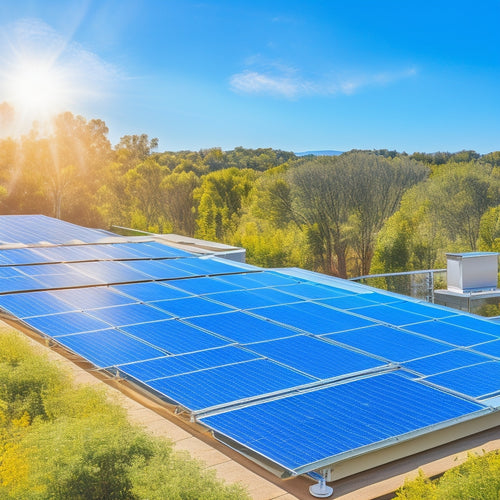
Lithium Ion Batteries for Solar Panels
Share
When integrating lithium-ion batteries with your solar panels, you're ensuring a reliable and efficient energy storage system. High energy density translates to maximum energy storage capacity, allowing you to utilize the full potential of your solar panels. With longer cycle life, lower maintenance costs, and a higher power-to-weight ratio, these batteries outperform traditional lead-acid batteries. Additionally, their low self-discharge rate and stable voltage hold guarantee a consistent power supply. By opting for lithium-ion batteries, you're investing in a sustainable and efficient solution that optimizes your solar panel system's performance. Now, investigate how to maximize their benefits in your specific application.
The Essentials
- Lithium-ion batteries offer high energy density, maximizing energy storage capacity while minimizing weight and volume for efficient solar panel systems.
- They provide extended durability and longer cycle life, reducing maintenance and replacement costs while enhancing reliability and ROI.
- Lithium-ion batteries feature a low self-discharge rate, retaining a high state of charge even when not in use, ensuring reliable backup power.
- A Battery Management System (BMS) is essential for peak performance and longevity, monitoring and controlling charging/discharging rates, temperature, and cell balancing.
- Higher round-trip efficiency in lithium-ion batteries minimizes energy losses, optimizing energy storage and release for solar panel applications.
High Energy Density Matters
When you're designing a solar panel system, high energy density matters because it directly impacts the energy storage capacity of your lithium-ion batteries.
You want to maximize the amount of energy stored per unit of weight and volume, which is critical for efficient energy storage. By opting for lithium-ion batteries, you can enjoy a higher number of charge cycles, lighter weight, and more compact designs, resulting in lower maintenance and replacement costs.
Energy Storage Capacity
Utilizing the full potential of solar panels relies heavily on the energy storage capacity of lithium-ion batteries, particularly regarding high energy density. You want to guarantee that your solar panel system can store excess energy generated during the day for use during the night or on cloudy days.
This is where capacity planning comes into play. By carefully planning your energy storage capacity, you can guarantee a seamless shift between solar power and battery power. A reliable battery for your solar panel system is essential, providing a stable source of backup power during outages and increasing the overall return on investment by maximizing energy independence renewable energy battery.
As you manage your energy, you'll want to take into account the overall energy storage capacity of your lithium-ion batteries. This will determine how much excess energy you can store and how long your batteries will last.
Effective energy management involves monitoring your energy usage patterns and adjusting your storage capacity accordingly. By doing so, you'll be able to optimize your energy storage capacity and make the most of your solar panel system.
With the right energy storage capacity, you'll enjoy greater freedom from the grid and a more reliable source of clean energy.
Power Per Unit Weight
Most lithium-ion batteries boast a high energy density, which translates to a significant amount of power per unit weight. This means you get more energy from a smaller, lighter package.
When it comes to solar panels, this high energy density is essential. You want to maximize your energy storage capacity without adding bulk or weight to your system. A high power-to-weight ratio is especially important for off-grid or portable solar applications where space and weight are limited.
As homeowners seek to optimize their solar power systems and achieve energy independence, renewable energy storage solutions like lithium-ion batteries are becoming increasingly popular.
In a weight comparison, lithium-ion batteries outperform lead-acid batteries, their traditional counterparts. You can store the same amount of energy in a lithium-ion battery that's roughly one-third the weight of a lead-acid battery. This makes lithium-ion batteries ideal for applications where weight is a concern, such as RVs, boats, or remote solar installations.
Additionally, their high energy density guarantees they're suitable for a wide range of applications, from small-scale residential systems to large-scale commercial installations.
Longer Cycle Life Guaranteed
You expect lithium-ion batteries for solar panels to last for a long time, and that's exactly what you get with a longer cycle life guarantee.
This means extended battery durability, allowing you to enjoy a consistent power supply without worrying about frequent replacements.
With renewable energy solutions, you can enjoy the benefits of solar energy storage and rely on your solar panels to perform efficiently even during off-grid systems.
With increased charge cycles, you can rely on your solar panels to perform effectively over an extended period.
Extended Battery Durability
One key advantage of lithium-ion batteries for solar panels is their extended durability, which translates to a longer cycle life guaranteed.
This means you can enjoy a reliable source of renewable energy without worrying about frequent replacements.
With proper battery maintenance, lithium-ion batteries can last up to 15 years or more, making them a cost-effective option in the long run.
Additionally, their extended lifespan reduces the environmental impact of battery production and disposal, aligning with your values of freedom and sustainability.
Increased Charge Cycles
Lithium-ion batteries' extended lifespan is closely tied to their ability to withstand increased charge cycles, which directly correlates to a longer cycle life guaranteed.
You can expect a significant enhancement in the overall performance of your solar panel system with optimized charge cycles. This is because lithium-ion batteries are designed to handle more charge and discharge cycles compared to traditional lead-acid batteries.
With advanced battery performance analysis, you can monitor and fine-tune your battery's performance to achieve maximum efficiency. By implementing charge cycle optimization strategies, you can reduce wear and tear on your batteries, ensuring they last longer and perform better.
This means you'll enjoy a more reliable and stable energy supply, giving you the freedom to live off the grid without worrying about power outages.
Low Self-Discharge Rate
When you're considering lithium-ion batteries for your solar panels, you'll want to look for ones with a low self-discharge rate, which is especially important for home solar battery systems that require reliable backup power.
This feature is vital in renewable energy systems that rely on solar panels and inverters to generate power. This means that even when the batteries aren't in use, they'll retain a high state of charge, thanks to their stable voltage hold.
As a result, you'll enjoy a longer cycle life, with your batteries performing at their best over many charge and discharge cycles.
Long Cycle Life
Your solar panel system's battery life is directly impacted by the self-discharge rate, which affects its overall performance and reliability.
However, another significant factor influencing your battery's longevity is its cycle life. A long cycle life guarantees your lithium-ion battery can withstand repeated charging and discharging without significant capacity loss. This is vital for solar panel systems, as they're designed to provide power during the day and recharge at night. A battery with a long cycle life can handle this regular cycling, resulting in a longer battery lifespan.
Proper maintenance practices, such as avoiding extreme temperatures and minimizing deep discharges, also contribute to a longer cycle life. Additionally, a longer cycle life reduces the environmental impact of your solar panel system, as you'll need to replace batteries less frequently. This, in turn, leads to lower cost considerations over the system's lifetime.
In usage scenarios where the battery is cycled daily, a long cycle life is necessary to maintain peak performance metrics. By choosing a lithium-ion battery with a long cycle life, you can make certain your solar panel system remains efficient, reliable, and environmentally friendly.
Stable VoltageHold
Frequently, solar panel system owners overlook a critical aspect of battery performance: the self-discharge rate. You want your lithium-ion batteries to hold their charge when not in use, ensuring you have power when you need it. A low self-discharge rate, also known as stable voltage hold, is essential for maintaining voltage stability and consistent output.
When you're not generating power, you don't want your batteries draining unnecessarily. A high self-discharge rate can lead to reduced capacity and overall system performance.
With lithium-ion batteries, you can expect a low self-discharge rate of around 2-3% per month. This means you can store energy for extended periods without significant losses.
Check Battery Management System
When you're selecting a lithium-ion battery for your solar panel system, you'll want to check the battery management system (BMS) for features that guarantee peak performance and longevity.
With the increasing adoption of renewable energy storage solutions, such as Tesla Powerwall, it's crucial to choose a BMS that can integrate seamlessly with your solar panel system.
You'll need a BMS that provides system monitoring alerts, so you can stay on top of any issues that may arise.
Additionally, look for a BMS with cell balancing control to prevent overcharging or undercharging individual cells.
System Monitoring Alerts
During peak solar hours, your lithium-ion battery system hums along efficiently, storing excess energy for later use. But what happens when something goes awry? That's where system monitoring alerts come in. Your battery management system (BMS) is designed to keep a watchful eye on performance, detecting potential issues before they become major problems.
| Alert Type | Description | Recommended Action |
|---|---|---|
| Low Battery Voltage | Voltage drops below 3.0V | Charge the battery as soon as possible |
| High Temperature | Temperature exceeds 45°C | Maintain proper ventilation and cooling |
| Overcharge | Battery is charged above 80% | Adjust charging settings or disconnect load |
| Communication Loss | BMS loses connection to system | Check connections and restart system |
These system alerts guarantee you're always in the know, allowing you to take corrective action and maintain peak performance. By keeping a close eye on your system's health, you can rest easy knowing your energy storage system is running smoothly and efficiently. With performance monitoring and system alerts, you're one step closer to achieving energy independence.
Cell Balancing Control
Each lithium-ion battery in your solar panel system comprises multiple cells, and maintaining their individual health is crucial for best performance. Unevenly charged cells can lead to reduced cell performance, decreased battery lifespan, and even safety issues. That's why cell balancing control is a critical component of your battery management system.
This control system monitors the state of charge of each cell and adjusts the charging or discharging current to guarantee that all cells are balanced. By doing so, you can prevent overcharging or undercharging, which can cause cell damage.
Cell balancing control also helps to prevent overheating, as unbalanced cells can generate excessive heat.
As you work towards energy independence, it's important to prioritize the health and longevity of your lithium-ion batteries. By implementing cell balancing control, you can maximize your battery's performance, extend its lifespan, and guarantee a safe and reliable operation.
With this control system in place, you can have peace of mind knowing that your solar panel system is running at its best, providing you with the freedom and autonomy you desire.
Higher Round Trip Efficiency
When you're optimizing energy storage, you're looking to minimize losses and maximize the amount of usable energy.
Lithium-ion batteries with higher round-trip efficiency can help you achieve this goal, as they're able to store and release more of the energy they receive.
Energy Storage Optimization
One essential aspect of maximizing the effectiveness of lithium-ion batteries for solar panels is energy storage optimization, which revolves around achieving higher round-trip efficiency.
You want to guarantee that the energy stored in your battery is used efficiently, minimizing losses and maximizing the benefits of your solar integration.
To achieve this, you need to optimize your energy storage system's performance, considering factors such as charging and discharging rates, depth of discharge, and battery health.
Frequently Asked Questions
Can Lithium-Ion Batteries Be Used for Both On-Grid and Off-Grid Solar Systems?
You're wondering if a battery type can handle both on-grid and off-grid systems; yes, you can use lithium-ion batteries for grid integration and energy storage in both scenarios, providing flexibility and freedom in your solar setup.
What Is the Typical Warranty Period for Lithium-Ion Solar Batteries?
You're likely to find that top-tier solar battery manufacturers offer warranties spanning 10 to 15 years, covering a significant chunk of their lifetime expectancy, with performance degradation guarantees that guarantee your energy independence isn't compromised over time.
Are Lithium-Ion Batteries Safe for Indoor Installation and Use?
When installing batteries indoors, you'll want to guarantee they're safe; lithium-ion batteries, in particular, pose battery fire risks if not properly ventilated. You'll need to provide adequate indoor ventilation to mitigate these risks and enjoy safe, reliable power.
Can I Install Lithium-Ion Batteries With Existing Solar Panel Systems?
You're trying to marry new batteries to your existing solar panel system, hoping for a harmonious union. Confirm compatibility first, as mismatched batteries can be a costly divorce, and factor in installation costs to avoid a financial shock.
Do Lithium-Ion Batteries Require Regular Maintenance or Upkeep?
You'll find that most batteries, regardless of their application, require some upkeep to maximize their lifespan. For you, this means monitoring charging cycles, keeping them away from extreme temperatures, and updating software to guarantee peak performance and extend their lifespan.
Final Thoughts
As you consider lithium-ion batteries for your solar panel system, remember that high energy density, long cycle life, and low self-discharge rate are vital. Don't forget to check the battery management system to guarantee peak performance. With higher round-trip efficiency, you'll get more out of your solar energy. Did you know that lithium-ion batteries can retain up to 80% capacity after 2,000 charge cycles? This impressive statistic highlights their reliability and long-term value for your solar panel investment.
Related Posts
-

What Types of Solar Energy Devices Are Available
You'll find several types of solar energy devices available today, each customized to different energy needs. Photovo...
-

Essential Hiking Lights for Safety and Fun
When you're hitting the trails, essential hiking lights are vital for safety and fun. A lightweight headlamp offers h...
-

Top Solar Powered Camping Fans for Camping Enthusiasts
If you're a camping enthusiast, a solar-powered fan can be a transformative element for your outdoor experience. Thes...


